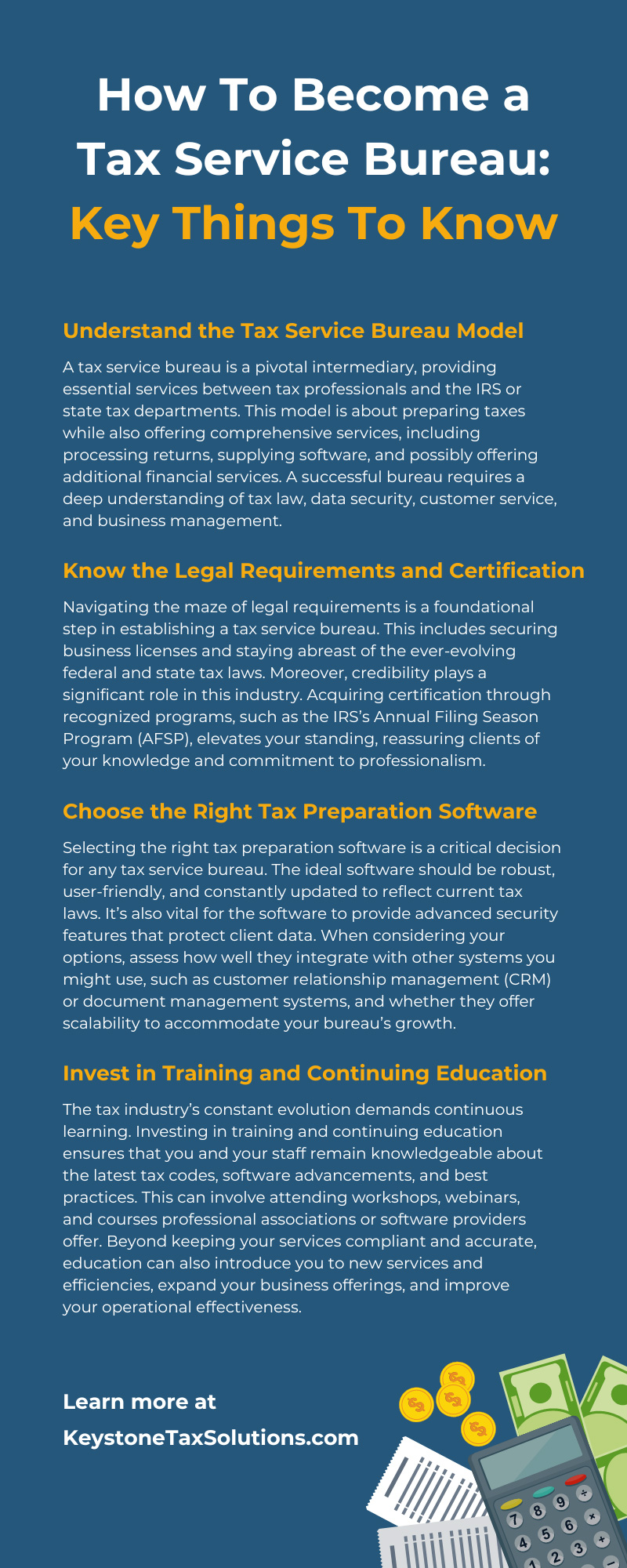Starting a tax service bureau involves more than just understanding tax laws; it’s about building a reliable, efficient, and client-focused business. Here’s an in-depth look at what you need to know about becoming a tax service bureau.
Understand the Tax Service Bureau Model
A tax service bureau is a pivotal intermediary, providing essential services between tax professionals and the IRS or state tax departments. This model is about preparing taxes while also offering comprehensive services, including processing returns, supplying software, and possibly offering additional financial services. For those looking to enter this sector, it’s crucial to recognize not only the breadth of services you can provide but also the responsibilities that come with handling sensitive client data. A successful bureau requires a deep understanding of tax law, data security, customer service, and business management.
Know the Legal Requirements and Certification
Navigating the maze of legal requirements is a foundational step in establishing a tax service bureau. This includes securing business licenses and staying abreast of the ever-evolving federal and state tax laws. Moreover, credibility plays a significant role in this industry. Acquiring certification through recognized programs, such as the IRS’s Annual Filing Season Program (AFSP), elevates your standing, reassuring clients of your knowledge and commitment to professionalism. These certifications often require ongoing education, ensuring you remain current with tax codes and best practices.
Choose the Right Tax Preparation Software
Selecting the right tax preparation software is a critical decision for any tax service bureau. The ideal software should be robust, user-friendly, and constantly updated to reflect current tax laws. It’s also vital for the software to provide advanced security features that protect client data. When considering your options, assess how well they integrate with other systems you might use, such as customer relationship management (CRM) or document management systems, and whether they offer scalability to accommodate your bureau’s growth. The choice of software can significantly impact your efficiency and the quality of service you provide, making it a key investment area for your business.
Invest in Training and Continuing Education
The tax industry’s constant evolution demands continuous learning. Investing in training and continuing education ensures that you and your staff remain knowledgeable about the latest tax codes, software advancements, and best practices. This can involve attending workshops, webinars, and courses professional associations or software providers offer. Beyond keeping your services compliant and accurate, education can also introduce you to new services and efficiencies, expand your business offerings, and improve your operational effectiveness.
Develop a Business Plan
A comprehensive business plan is the blueprint for success in any venture, including starting a tax service bureau. This plan should outline your business structure, target market, services offered, and pricing strategy. Additionally, it should address operational considerations such as staffing, office space, and technology needs. A well-crafted business plan not only guides your strategic decisions but also helps secure financing by demonstrating the viability of your business to potential investors or lenders.
Secure Your EFIN
An electronic filing identification number (EFIN) is necessary to file tax returns electronically on behalf of your clients. Obtaining an EFIN from the IRS is a process that involves an application, background checks, and sometimes fingerprinting. Since this process can take some time, starting early is advisable, ensuring you’re ready to operate by tax season. This number is crucial for your business, as it legitimizes your operation in the eyes of the IRS and allows you to provide essential electronic filing services to your clients.
Implement Strong Data Security Measures
In an era where data breaches are increasingly common, implementing stringent data security measures is non-negotiable for tax service bureaus. This involves using encrypted software, operating through secure client portals for document exchange, and training your team on data privacy laws and best practices. Regularly updating your security protocols and conducting audits can help protect your clients’ sensitive information from cyber threats, reinforcing your bureau’s reputation as a trustworthy service provider.
Obtain Professional Liability Insurance
Given the high stakes in tax preparation, carrying professional liability insurance—also known as errors and omissions insurance—is prudent. This insurance protects your business from claims related to mistakes or oversights in the tax services you provide. It can cover legal fees, settlements, or judgments, safeguarding your financial stability and peace of mind. When selecting a policy, ensure it’s tailored to the unique risks of the tax preparation industry.
Build a Client Base
Building a robust client base requires a multifaceted approach that combines outstanding service with effective marketing. Offer free educational workshops or webinars on tax-related topics to attract potential clients and establish your expertise. Networking, both online and in-person, can also expand your visibility. Providing exceptional service leads to word-of-mouth referrals, arguably the most powerful marketing tool in the service industry. Consider leveraging social media and a well-designed website to showcase your services and client testimonials.
Set Competitive Pricing
Pricing your services competitively yet profitably is a delicate balance. Conduct market research to understand the going rates for tax services in your area and consider your target market’s budget constraints. Offering a range of pricing options for different service levels can cater to a wider audience, from individuals seeking basic tax filing to businesses requiring comprehensive tax strategies. Transparency in pricing is key to building trust with your clients.
Offer Multiple Services
Diversifying your service offerings can distinguish your bureau from competitors. In addition to basic tax preparation, consider offering tax planning, resolution services, bookkeeping, and business consulting. This provides additional value to your clients and opens up multiple revenue streams for your business. Tailoring these services to meet the specific needs of your clientele can enhance customer satisfaction and loyalty.
Emphasize Customer Service
Exceptional customer service is at the heart of a successful tax service bureau. Ensure your team is knowledgeable, responsive, and empathetic to client needs. Implementing a CRM system can streamline communication and help manage client information efficiently. Promptly addressing concerns and exceeding in your service delivery can lead to lasting client relationships.
Become a Tax Service Bureau
Understanding how to become a tax service bureau involves recognizing the multifaceted nature of the business. From securing the necessary legal certifications to choosing the right software, implementing robust security measures, and developing a comprehensive marketing strategy, each step is critical. Remember, pursuing continuous education, leveraging technology, and prioritizing exceptional customer service are key components of a successful tax service bureau. As you embark on this journey, take each step carefully, ensuring your bureau is positioned to meet your clients’ needs and succeed in the competitive tax preparation arena.
With these key things to know about becoming a tax service bureau, you’re equipped with the essential insights and steps to launch and operate a successful business. Embrace the challenge, and you’ll find yourself at the helm of a thriving service that plays a crucial role in the financial landscape.



